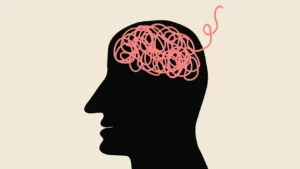If you are someone who struggles with ADHD, then you know that stress is a common issue for you. In fact, stress may be one of the biggest challenges that you face on a daily basis. It can be difficult to manage your time and stay organized when you’re constantly feeling overwhelmed. In this blog post, we will discuss how ADHD affects stress levels and what you can do to manage them. We will also provide some helpful tips for coping with stress in everyday life.
Contents
What Are ADHD And Stress?
 We are no strangers to the term “stress.” In today’s society, it seems like we are constantly under pressure to perform. We are juggling work, family, and social obligations. It can be difficult to keep up with everything and still have time for ourselves. For people with ADHD, stress can be even more challenging to manage.
We are no strangers to the term “stress.” In today’s society, it seems like we are constantly under pressure to perform. We are juggling work, family, and social obligations. It can be difficult to keep up with everything and still have time for ourselves. For people with ADHD, stress can be even more challenging to manage.
ADHD stands for Attention Deficit Hyperactivity Disorder. It is a neurological disorder that affects the way the brain functions. People with ADHD often have trouble paying attention, controlling impulsive behaviors, and regulating their emotions. These symptoms can make everyday tasks feel more difficult and overwhelming.
Both these are a real pain to deal with. It is hard enough to keep up with the demands of everyday life, but when you add in the symptoms of ADHD, it can be even more challenging.
How Does ADHD Affect Stress Levels?
As we know, stress is an inevitable part of life. Everyone struggles with it. However, for people with ADHD, stress can be a much more significant issue. The symptoms of ADHD can make it difficult to manage day-to-day tasks. This can lead to feelings of being overwhelmed and stressed out. There are a few different ways that ADHD can affect stress levels:
- Difficulty focusing: One of the most common symptoms of ADHD is difficulty focusing. This can make it hard to pay attention to what you’re doing. As a result, you may feel like you’re constantly behind and struggling to catch up.
- Impulsivity: People with ADHD often have trouble controlling impulsive behaviors. This can lead to making rash decisions or acting without thinking things through. These choices can add more stress to your life and make it difficult to stick to a plan.
- Emotional dysregulation: People with ADHD often have trouble regulating their emotions. This can mean that you feel overwhelmed by your emotions or that you have outbursts of anger. These symptoms can add more stress to your life and make it difficult to cope with everyday challenges.
- Poor time management: One of the most common challenges for people with ADHD is poor time management. It can be difficult to stay organized and on track when you’re constantly feeling overwhelmed. This can lead to missing deadlines, forgetting important tasks, and feeling like you’re always behind.
- Comparison: People with ADHD may often compare themselves to others. They might feel like they are not good enough or that they are falling behind. This can lead to feelings of inadequacy and low self-esteem, which is further consequent to stress.
- Multitasking: People with ADHD often have difficulty multitasking. This can lead to feeling overwhelmed when you’re trying to do too many things at once. This is also a common cause of stress.
These are all the possible ways ADHD might affect stress levels. As you can see, it can be difficult to manage your symptoms and still have a successful life.
Can Stress Impact ADHD Symptoms?
 When talking about similar yet parallel topics, it’s important to make a distinction between the two. In this instance, stress does not CAUSE ADHD, but rather can be a byproduct or symptom of it. It can also worsen pre-existing symptoms and trigger new ones. Stress is often thought of as an emotional response to an externally stressful event. For people with ADHD, however, stress is often constant and internal, stemming from the challenges of living with ADHD itself. There are a few different ways that stress can impact people with ADHD.
When talking about similar yet parallel topics, it’s important to make a distinction between the two. In this instance, stress does not CAUSE ADHD, but rather can be a byproduct or symptom of it. It can also worsen pre-existing symptoms and trigger new ones. Stress is often thought of as an emotional response to an externally stressful event. For people with ADHD, however, stress is often constant and internal, stemming from the challenges of living with ADHD itself. There are a few different ways that stress can impact people with ADHD.
- First, it can cause problems with focus and concentration. When someone is feeling stressed, their mind is more likely to wander and they may have trouble staying on task.
- Second, stress can lead to impulsivity and poor decision-making. People with ADHD may be more likely to take risks or make impulsive decisions when they’re feeling stressed.
- Moreover, the paranoia of living with ADHD can be greatly amplified when under stress. This is because people with ADHD often have a hard time separating reality from their thoughts. When they’re feeling stressed, they may be more likely to believe their negative thoughts and worry about things that might not actually happen.
- Stress can further worsen symptoms of ADHD that are already present. For example, someone with ADHD who struggles with time management may find it even harder to stay organized and on track when they’re feeling stressed.
- Finally, stress can cause problems with emotional regulation. People with ADHD may have trouble managing their emotions when they’re feeling stressed, leading to outbursts or meltdowns.
All of these impacts can lead to even more stress, creating a vicious cycle for people with ADHD.
What Are The Warning Signs?
 It is important to be aware of the warning signs of stress in order to take action and prevent it from getting worse. Some common warning signs of stress include:
It is important to be aware of the warning signs of stress in order to take action and prevent it from getting worse. Some common warning signs of stress include:
- Feeling overwhelmed or out of control
- Trouble sleeping or sleeping too much
- Changes in appetite
- Mood swings
- Difficulty concentrating
- Worrying more than usual
- Aches and pains
- Excessive fatigue
These signs can amplify the already existing signs of ADHD. However, in some cases, people might not even realize they are exhibiting these due to the fact that they are so used to living in a state of stress. If you suspect that you or someone you know is experiencing high levels of stress, it’s important to reach out for help.
How Do They Impact Life?
ADHD by itself can have severe impacts on day-to-day life. It can make it hard to succeed in school or keep a job. When combined with stress, the effects can be even more debilitating.
For example, if someone with ADHD is constantly worrying about their symptoms, they may have trouble concentrating at work or school. This can lead to lower grades or getting fired. Moreover, the impulsivity caused by ADHD can lead to financial problems if someone makes impulsive decisions with their money.
Stress can also worsen the already existing effects of ADHD on relationships. When people with ADHD are feeling stressed, they may be more likely to lash out at loved ones or become withdrawn. This can lead to arguments, breakups, and isolation.
It’s important to remember that everyone experiences stress in different ways. What may be a small stressful event for one person could be a major trigger for someone with ADHD. It’s important to be mindful of your own stress levels and how they impact your life.
How To Manage?
Fortunately, there are a ton of different ways to manage stress. You can either approach professional guidance or adopt self-help strategies.
Professional Help
Since there is no permanent cure to reverse or remove ADHD, the focus of treatment is to manage the symptoms. Many people with ADHD find that therapy or counseling can be helpful in managing stress. A therapist can help you to understand your triggers and how to cope with them. They can also teach you stress management techniques.
Additionally, medication can be used to treat ADHD and its symptoms. Stimulant medications are the most commonly prescribed type of medication for ADHD. They can help to improve focus and concentration. However, they can also have some side effects, such as insomnia and anxiety. If you’re considering taking medication for ADHD, it’s important to speak with a doctor to see if it’s right for you.
If you are battling chronic stress, there are therapies and medications are available to help you cope. These aim to help you by teaching you how to manage your symptoms in a more effective way.
Self-Help
 There are also various hacks that you can adopt by yourself to improve your quality of life. These include the following.
There are also various hacks that you can adopt by yourself to improve your quality of life. These include the following.
- Exercise: Exercise releases endorphins, which can help improve your mood and reduce stress.
- Yoga: Yoga involves both physical and mental activity, which can help to center your thoughts and calm your mind.
- Mindfulness: Mindfulness is a form of meditation that that involves involves focusing on the present moment.
- Deep breathing: Deep breathing can help to slow down your heart rate and calm your body.
- Journaling: Journaling can help to organize your thoughts and release pent-up emotions.
- Sleep hygiene: Getting enough sleep is crucial for managing stress. Practicing good sleep hygiene can help to improve the quality of your sleep.
- Dietary changes: Eating a healthy diet can help to improve your overall mood and energy levels.
- Support system: Having a strong support system of family and friends can help you to feel less alone and stressed.
There are a number of different ways to manage stress, both with professional help and through self-help methods. It is important to find what works best for you in order to live a healthy and happy life.
Conclusion
To conclude, we can affirm that ADHD and stress are a dangerous combination. However, by being mindful of your stress levels and how they impact your life, you can find ways to manage them effectively. With the help of professionals or through self-help methods, you can learn how to live a happy and healthy life despite the challenges of ADHD.
If you or someone you know is looking for psychological help, Therapy Mantra is here for you. We are the leading providers of online therapy and counseling. Our team of highly trained and experienced therapists can provide assistance at the most affordable rates. Contact us today to learn more about our services. You may also visit our website to book an online therapy session or download our free Android or iOS app for more information.


